Bizhe (Long Live) Kordistan
There’s a plane carrying a Turk, Fars, American, Baluchi, and Kurd. The plane’s about to crash, so the Turk tells everyone to jump. Everybody dies, except for the Kurd. Why? Because the wind caught inside his billowing pants, allowing him to float to safety.
This is a Kurdish joke, told to me by a resident of Bonneh, a town located in Kordistan, one of Iran’s many provinces. Iranian Kurds exist in Kordistan, Kermanshah, and in regions of Azerbaijan. Kordistan Kurds are Sunni Muslims, while Kermanshahi ones are predominantly Shi’a. Even though these Kurdish populations neighbor each other along Iran’s western border, their dialects are quite different. Kermanshahi Kurdish contains about 50% Farsi, while Kordistani Kurdish embodies only 10%.
My friend Sarieh took me on a tour of Bonneh, her hometown, during a short break from her architecture studies in Tehran. Unlike Kordistan's capital, Sanandaj, Bonneh does not have a single historic building within its bounds. As Sarieh explains, Bonneh was a land over which ancient rulers frequently battled. Every time infrastructure was built, a war would break, and the opposing forces would torch the entire area. As a result of constant destruction and reconstruction, Bonneh's houses and buildings reflect only recent history.
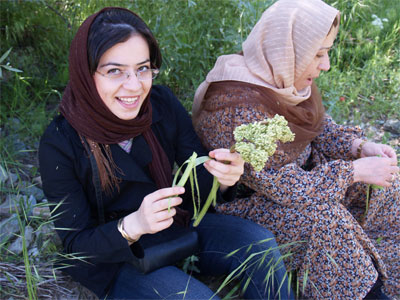 This is Sarieh munching on rivas, a springtime plant that grows in the mountains of the region. The plant resembles a fusion between celery, bananas, broccoli, and unripe plums. Celery, because it looks like one, and makes the same crunch noise when bitten; bananas, because you need to peel off the sturdy outer layer; broccoli, because of the flower formation at the top; and unripe plum because the inside tastes cool and sour. Practically everyone here would snack on these, consuming at least five per sitting.
This is Sarieh munching on rivas, a springtime plant that grows in the mountains of the region. The plant resembles a fusion between celery, bananas, broccoli, and unripe plums. Celery, because it looks like one, and makes the same crunch noise when bitten; bananas, because you need to peel off the sturdy outer layer; broccoli, because of the flower formation at the top; and unripe plum because the inside tastes cool and sour. Practically everyone here would snack on these, consuming at least five per sitting.
One aspect that immediately stands out in Bonneh is the fashion. At every corner, men and boys don their traditional dress—puffed out pants tapered at the ankles and tied securely at the waist, often coupled with a buttoned-up, collared shirt, and a fabric wrap-around belt. Some opt for the full suit, which entails a special jumpsuit-styled ensemble that incorporates the parachute pants and fabric belt. The jumpsuit opens at the chest to reveal a collared shirt, and may be complemented with a turban-type head wrap and handmade wool shoes.
In this society, males have more pressure to dress in these customary garments. Those who sport the latest trends from Tehran are viewed as sell-outs, or perhaps “Farsis,” the name given to ethnic Iranians.
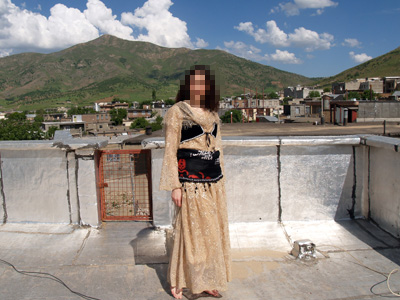 Young women reserve their traditional attire for the home, visiting family and friends in the evening, or parties. Here’s an example of an outfit worn to a wedding:
Young women reserve their traditional attire for the home, visiting family and friends in the evening, or parties. Here’s an example of an outfit worn to a wedding:
Another aspect of this town was the picturesque scenery. Rolling hills decked with multi-shaded greenery, clusters of goldenrod flowers mottling the rustic countryside, herds of sheep munching on lush pastures, oceans of wheat rippling in waves caused by the wind; these details provide only a taste of Bonneh's natural landscape.
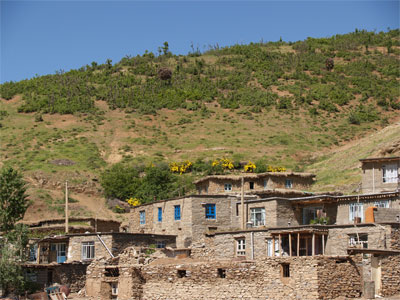 My friend’s father was the headmaster of a junior high school in a rural area, located on the outskirts of Bonneh. He took us to visit the school on his last day, prior to retirement. After 30 years of teaching, he must retire, in order to open up positions for younger educators.
My friend’s father was the headmaster of a junior high school in a rural area, located on the outskirts of Bonneh. He took us to visit the school on his last day, prior to retirement. After 30 years of teaching, he must retire, in order to open up positions for younger educators.
According to him, the income of retirees is determined by the salary of the last two years of employment. Most in the teaching profession, including him, relocate to rural schools for the last two years because the pay is higher. I think it’s a win-win situation—pensions get a boost, and kids from rural areas get to experience a “transfer of technology” from the surrounding towns and cities.
This rural school was different than its counterparts in the city for a number of reasons. First, the population of students was significantly lower. Even though this school serves three different villages, the amount of pupils present was mediocre, with the majority hailing from the poorest and farthest away community. The headmaster said it was difficult convincing parents to send their kids to school everyday. Many saw their children as farm hands, crucial for tilling the land and maintaining the laborious country life. But the kids from the poorest and most remote village, surprisingly, held the record for the most frequent attendance, neatest grooming, highest level of self-discipline, and greatest affinity for learning.

Another difference was that male and female students shared the same classroom, albeit with boys on one side, and girls on the other. In the city, the sexes are separated from first grade through high school, until uniting once again, in college. However, in this rural school where turnout is meager, co-ed classrooms are essential.
A third aspect that differed was the disproportionate girl to boy ratio. For every two boys, there was less than one girl. This is unusual in a country where 63% of university students are female. The headmaster said that country fathers were less likely to allow their daughters to continue their education past the fifth grade. Girls, he added, yield twice the amount of work than boys. They not only assist in cultivation of land, but create milk, butter and cheese, tend to the animals, keep house, and feed the family. The headmaster has even made special trips to the homes of a few of his female students who displayed potential for academic stardom, in hopes of convincing their fathers to allow continuation of studies into high school and college. But he says the father usually remains firmly planted in his decision, while the daughter, who avidly takes pleasure from school, is left crestfallen, as her future encompasses nothing beyond the realm of her father’s land.
One last distinction was the students’ dress code. Boys wore the traditional Kurdish parachute pants to school, while girls donned the typical monto (coat-like covering) and maghna’ay (a fabric with a hole in it that’s slipped over the face; this head covering doesn’t slip off, and is usually worn in more formal settings, such as school and work). Unlike in the city, girls’ clothing exhibited a variety of colors. City students must wear color-specific clothing, a trend that continues into high school.
Since Kurdish kids learn to speak Kurdish first, in their homes, prior to entering the school system where Farsi is taught, some find it difficult to adjust. Teaching core subjects in different languages is not permitted in Iran's public schools. This rule applies to the Turks, Kurds, Baluchis, Arabs, and other ethnicities that make up the diverse nation of Iran. However, some teachers in Bonneh try to incorporate the spoken Kurdish language in elementary studies, in order to help students slowly overcome the language barrier between Farsi and Kurdish. But all educational materials, such as books and worksheets, are in Farsi.
While class was in session, my friend and I roamed around the village, searching for people to talk to. Women who were busy working would invite us in, and insist on feeding us. This wasn’t the ordinary tarrof I’ve encountered in most Iranians. Rather, they were forceful about hosting us, as we were obviously guests in their village.
 This woman, captured with her four children, is the wife of a mullah. She, her youngest daughter, and her son are dressed in traditional Kordi (Kurdish) attire. Her home was roomy, and stocked with electronic appliances characteristic of any Tehrani household—washing machine, television, electronic churner, and others. My friend exclaimed at how clean and neat the home was. Perhaps she thought the interior would be as rustic as the exterior.
This woman, captured with her four children, is the wife of a mullah. She, her youngest daughter, and her son are dressed in traditional Kordi (Kurdish) attire. Her home was roomy, and stocked with electronic appliances characteristic of any Tehrani household—washing machine, television, electronic churner, and others. My friend exclaimed at how clean and neat the home was. Perhaps she thought the interior would be as rustic as the exterior.
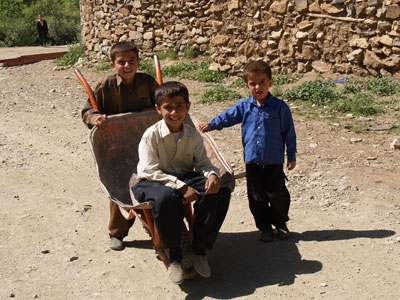 As we continued to meander through the village, we realized that these boys were following us in their wheelbarrow. Something I noticed about many of the kids in this region was their lightly-colored eyes. Also, they giggled a lot, and behaved in a bashful manner. Furthermore, they possessed some of the most gorgeous Iranian names, many of which I haven’t heard in ages, such as Asal (honey), Dariush (King Darius), Rozheen (brilliance), Golnoosh (flower drink), Roya (dream), Siavash (character in “Shahnameh”—Persian folktales), Milad (Christmas), and the list continues.
As we continued to meander through the village, we realized that these boys were following us in their wheelbarrow. Something I noticed about many of the kids in this region was their lightly-colored eyes. Also, they giggled a lot, and behaved in a bashful manner. Furthermore, they possessed some of the most gorgeous Iranian names, many of which I haven’t heard in ages, such as Asal (honey), Dariush (King Darius), Rozheen (brilliance), Golnoosh (flower drink), Roya (dream), Siavash (character in “Shahnameh”—Persian folktales), Milad (Christmas), and the list continues.
The names surprised me because I had expected Kurdish nationalism to supersede Iranian culture, in at least the area where names are concerned. I asked my friend if Kurds were allowed to assign Kurdish names to their children, and she said, “Yes, but we cannot officially use the names of a few famous Kurdish independence leaders. Those names, if given, are not recorded on birth certificates, but rather used only among family and friends.”
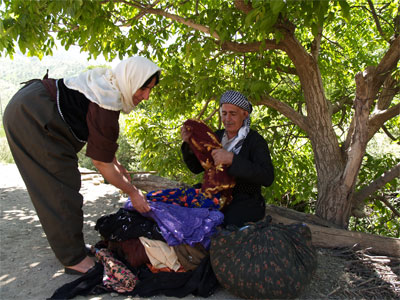 We made a stop at another family’s home, where the mother had forced us to submit to her hospitality. With a serious expression, she would firmly assert, “By God, you will stay for another cup of tea,” every time we started to rise from the floor. She had obviously been arduously tilling land that day, for she was wearing a pair of her husband’s parachute pants. Rural women switch from colorful dress to men’s pants when they plan to work the fields (as exhibited in the picture with the fabric salesman).
We made a stop at another family’s home, where the mother had forced us to submit to her hospitality. With a serious expression, she would firmly assert, “By God, you will stay for another cup of tea,” every time we started to rise from the floor. She had obviously been arduously tilling land that day, for she was wearing a pair of her husband’s parachute pants. Rural women switch from colorful dress to men’s pants when they plan to work the fields (as exhibited in the picture with the fabric salesman).
Our hostess was definitely over 60 years-old, but she had the ferocity of a grizzly bear. Her daughter had just completed high school, with an emphasis on graphic arts. The father had consented to continuing her education at a university. Clearly, he was open-minded enough to let her get a diploma. Unfortunately, she didn’t take the standardized tests for college because her two brothers had not permitted it. The girl seemed a bit forlorn about the situation, but was resolute about taking the tests next year, and going after her university degree, anyway.
One of the good things about Iran is that government universities are free, as long as you make it in. So, if you live on a farm, and your father refuses to pay for your university education, you don’t need to remain hopeless. Instead, you study vigorously for the standardized tests, and hope you score high within your region.
This particular home not only had all of the essential appliances, but also satellite television! Even though satellite dishes are illegal to own in Iran, the law is not enforced. Practically every single household in Tehran possesses a dish, an observable fact of high-rise apartment buildings—rows of balconies dotted with dishes can be seen from the street. But I hadn’t expected such technology to exist even in the most rural areas, especially since dishes cost around $250 a piece.
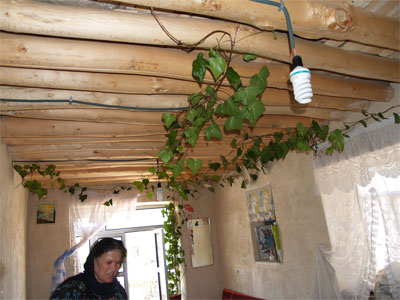 In a home where the ceilings were (fashionably) made of tree trunks, and where the furnace used oil, instead of gas, one would not expect to find a satellite dish.
In a home where the ceilings were (fashionably) made of tree trunks, and where the furnace used oil, instead of gas, one would not expect to find a satellite dish.
Among the many highlights of my short trip to Bonneh, most of which are documented in the Culture & Art album under the Photos section, was the subtle courtship that took place between my friend’s family and me. See, my friend’s older brother, also a university student in Tehran, is around my age, the perfect age for marriage, in Iran. Apparently, I made the mistake of commenting on how her brother was good-looking, as I flipped through family photos. But I hadn’t meant anything by it.
Anyway, after that fatal slip of the tongue, I sensed plenty of whispers around me throughout the extent of my stay, but pretended not to notice. My friend, while suddenly deciding to call her brother in Tehran, tried to hand me the receiver to talk to him; but I’m not a phone person, so I waved my hands frantically in front of my face, while shaking my head and silently mouthing, in Farsi, “No, I can’t; it’s embarrassing.” After she continued to insist, as her bro waited on the other end of the line—probably equally as helpless in the situation—I ran away and hid in a corner. I also was videotaped a lot, while wearing my friend’s fancy Kurdish dresses (which I wanted to capture on my own camera, seeing as how I don’t own any such cultural garments). Her extremely kind-hearted mother asked me to spin around, and show off my pretty dress; flip my hair around; smile and wink at the camera; and carry out other “dainty-flower-girl-tea-party-I-like-dollies-and-pink”-type acts. Of course, I respectfully declined.
I should write a book on all the awkward marriage moments I’ve endured in Iran.
This is a Kurdish joke, told to me by a resident of Bonneh, a town located in Kordistan, one of Iran’s many provinces. Iranian Kurds exist in Kordistan, Kermanshah, and in regions of Azerbaijan. Kordistan Kurds are Sunni Muslims, while Kermanshahi ones are predominantly Shi’a. Even though these Kurdish populations neighbor each other along Iran’s western border, their dialects are quite different. Kermanshahi Kurdish contains about 50% Farsi, while Kordistani Kurdish embodies only 10%.
My friend Sarieh took me on a tour of Bonneh, her hometown, during a short break from her architecture studies in Tehran. Unlike Kordistan's capital, Sanandaj, Bonneh does not have a single historic building within its bounds. As Sarieh explains, Bonneh was a land over which ancient rulers frequently battled. Every time infrastructure was built, a war would break, and the opposing forces would torch the entire area. As a result of constant destruction and reconstruction, Bonneh's houses and buildings reflect only recent history.
 This is Sarieh munching on rivas, a springtime plant that grows in the mountains of the region. The plant resembles a fusion between celery, bananas, broccoli, and unripe plums. Celery, because it looks like one, and makes the same crunch noise when bitten; bananas, because you need to peel off the sturdy outer layer; broccoli, because of the flower formation at the top; and unripe plum because the inside tastes cool and sour. Practically everyone here would snack on these, consuming at least five per sitting.
This is Sarieh munching on rivas, a springtime plant that grows in the mountains of the region. The plant resembles a fusion between celery, bananas, broccoli, and unripe plums. Celery, because it looks like one, and makes the same crunch noise when bitten; bananas, because you need to peel off the sturdy outer layer; broccoli, because of the flower formation at the top; and unripe plum because the inside tastes cool and sour. Practically everyone here would snack on these, consuming at least five per sitting.One aspect that immediately stands out in Bonneh is the fashion. At every corner, men and boys don their traditional dress—puffed out pants tapered at the ankles and tied securely at the waist, often coupled with a buttoned-up, collared shirt, and a fabric wrap-around belt. Some opt for the full suit, which entails a special jumpsuit-styled ensemble that incorporates the parachute pants and fabric belt. The jumpsuit opens at the chest to reveal a collared shirt, and may be complemented with a turban-type head wrap and handmade wool shoes.
In this society, males have more pressure to dress in these customary garments. Those who sport the latest trends from Tehran are viewed as sell-outs, or perhaps “Farsis,” the name given to ethnic Iranians.
 Young women reserve their traditional attire for the home, visiting family and friends in the evening, or parties. Here’s an example of an outfit worn to a wedding:
Young women reserve their traditional attire for the home, visiting family and friends in the evening, or parties. Here’s an example of an outfit worn to a wedding:Another aspect of this town was the picturesque scenery. Rolling hills decked with multi-shaded greenery, clusters of goldenrod flowers mottling the rustic countryside, herds of sheep munching on lush pastures, oceans of wheat rippling in waves caused by the wind; these details provide only a taste of Bonneh's natural landscape.
 My friend’s father was the headmaster of a junior high school in a rural area, located on the outskirts of Bonneh. He took us to visit the school on his last day, prior to retirement. After 30 years of teaching, he must retire, in order to open up positions for younger educators.
My friend’s father was the headmaster of a junior high school in a rural area, located on the outskirts of Bonneh. He took us to visit the school on his last day, prior to retirement. After 30 years of teaching, he must retire, in order to open up positions for younger educators. According to him, the income of retirees is determined by the salary of the last two years of employment. Most in the teaching profession, including him, relocate to rural schools for the last two years because the pay is higher. I think it’s a win-win situation—pensions get a boost, and kids from rural areas get to experience a “transfer of technology” from the surrounding towns and cities.
This rural school was different than its counterparts in the city for a number of reasons. First, the population of students was significantly lower. Even though this school serves three different villages, the amount of pupils present was mediocre, with the majority hailing from the poorest and farthest away community. The headmaster said it was difficult convincing parents to send their kids to school everyday. Many saw their children as farm hands, crucial for tilling the land and maintaining the laborious country life. But the kids from the poorest and most remote village, surprisingly, held the record for the most frequent attendance, neatest grooming, highest level of self-discipline, and greatest affinity for learning.

Another difference was that male and female students shared the same classroom, albeit with boys on one side, and girls on the other. In the city, the sexes are separated from first grade through high school, until uniting once again, in college. However, in this rural school where turnout is meager, co-ed classrooms are essential.
A third aspect that differed was the disproportionate girl to boy ratio. For every two boys, there was less than one girl. This is unusual in a country where 63% of university students are female. The headmaster said that country fathers were less likely to allow their daughters to continue their education past the fifth grade. Girls, he added, yield twice the amount of work than boys. They not only assist in cultivation of land, but create milk, butter and cheese, tend to the animals, keep house, and feed the family. The headmaster has even made special trips to the homes of a few of his female students who displayed potential for academic stardom, in hopes of convincing their fathers to allow continuation of studies into high school and college. But he says the father usually remains firmly planted in his decision, while the daughter, who avidly takes pleasure from school, is left crestfallen, as her future encompasses nothing beyond the realm of her father’s land.
One last distinction was the students’ dress code. Boys wore the traditional Kurdish parachute pants to school, while girls donned the typical monto (coat-like covering) and maghna’ay (a fabric with a hole in it that’s slipped over the face; this head covering doesn’t slip off, and is usually worn in more formal settings, such as school and work). Unlike in the city, girls’ clothing exhibited a variety of colors. City students must wear color-specific clothing, a trend that continues into high school.
Since Kurdish kids learn to speak Kurdish first, in their homes, prior to entering the school system where Farsi is taught, some find it difficult to adjust. Teaching core subjects in different languages is not permitted in Iran's public schools. This rule applies to the Turks, Kurds, Baluchis, Arabs, and other ethnicities that make up the diverse nation of Iran. However, some teachers in Bonneh try to incorporate the spoken Kurdish language in elementary studies, in order to help students slowly overcome the language barrier between Farsi and Kurdish. But all educational materials, such as books and worksheets, are in Farsi.
While class was in session, my friend and I roamed around the village, searching for people to talk to. Women who were busy working would invite us in, and insist on feeding us. This wasn’t the ordinary tarrof I’ve encountered in most Iranians. Rather, they were forceful about hosting us, as we were obviously guests in their village.
 This woman, captured with her four children, is the wife of a mullah. She, her youngest daughter, and her son are dressed in traditional Kordi (Kurdish) attire. Her home was roomy, and stocked with electronic appliances characteristic of any Tehrani household—washing machine, television, electronic churner, and others. My friend exclaimed at how clean and neat the home was. Perhaps she thought the interior would be as rustic as the exterior.
This woman, captured with her four children, is the wife of a mullah. She, her youngest daughter, and her son are dressed in traditional Kordi (Kurdish) attire. Her home was roomy, and stocked with electronic appliances characteristic of any Tehrani household—washing machine, television, electronic churner, and others. My friend exclaimed at how clean and neat the home was. Perhaps she thought the interior would be as rustic as the exterior. As we continued to meander through the village, we realized that these boys were following us in their wheelbarrow. Something I noticed about many of the kids in this region was their lightly-colored eyes. Also, they giggled a lot, and behaved in a bashful manner. Furthermore, they possessed some of the most gorgeous Iranian names, many of which I haven’t heard in ages, such as Asal (honey), Dariush (King Darius), Rozheen (brilliance), Golnoosh (flower drink), Roya (dream), Siavash (character in “Shahnameh”—Persian folktales), Milad (Christmas), and the list continues.
As we continued to meander through the village, we realized that these boys were following us in their wheelbarrow. Something I noticed about many of the kids in this region was their lightly-colored eyes. Also, they giggled a lot, and behaved in a bashful manner. Furthermore, they possessed some of the most gorgeous Iranian names, many of which I haven’t heard in ages, such as Asal (honey), Dariush (King Darius), Rozheen (brilliance), Golnoosh (flower drink), Roya (dream), Siavash (character in “Shahnameh”—Persian folktales), Milad (Christmas), and the list continues. The names surprised me because I had expected Kurdish nationalism to supersede Iranian culture, in at least the area where names are concerned. I asked my friend if Kurds were allowed to assign Kurdish names to their children, and she said, “Yes, but we cannot officially use the names of a few famous Kurdish independence leaders. Those names, if given, are not recorded on birth certificates, but rather used only among family and friends.”
 We made a stop at another family’s home, where the mother had forced us to submit to her hospitality. With a serious expression, she would firmly assert, “By God, you will stay for another cup of tea,” every time we started to rise from the floor. She had obviously been arduously tilling land that day, for she was wearing a pair of her husband’s parachute pants. Rural women switch from colorful dress to men’s pants when they plan to work the fields (as exhibited in the picture with the fabric salesman).
We made a stop at another family’s home, where the mother had forced us to submit to her hospitality. With a serious expression, she would firmly assert, “By God, you will stay for another cup of tea,” every time we started to rise from the floor. She had obviously been arduously tilling land that day, for she was wearing a pair of her husband’s parachute pants. Rural women switch from colorful dress to men’s pants when they plan to work the fields (as exhibited in the picture with the fabric salesman). Our hostess was definitely over 60 years-old, but she had the ferocity of a grizzly bear. Her daughter had just completed high school, with an emphasis on graphic arts. The father had consented to continuing her education at a university. Clearly, he was open-minded enough to let her get a diploma. Unfortunately, she didn’t take the standardized tests for college because her two brothers had not permitted it. The girl seemed a bit forlorn about the situation, but was resolute about taking the tests next year, and going after her university degree, anyway.
One of the good things about Iran is that government universities are free, as long as you make it in. So, if you live on a farm, and your father refuses to pay for your university education, you don’t need to remain hopeless. Instead, you study vigorously for the standardized tests, and hope you score high within your region.
This particular home not only had all of the essential appliances, but also satellite television! Even though satellite dishes are illegal to own in Iran, the law is not enforced. Practically every single household in Tehran possesses a dish, an observable fact of high-rise apartment buildings—rows of balconies dotted with dishes can be seen from the street. But I hadn’t expected such technology to exist even in the most rural areas, especially since dishes cost around $250 a piece.
 In a home where the ceilings were (fashionably) made of tree trunks, and where the furnace used oil, instead of gas, one would not expect to find a satellite dish.
In a home where the ceilings were (fashionably) made of tree trunks, and where the furnace used oil, instead of gas, one would not expect to find a satellite dish.Among the many highlights of my short trip to Bonneh, most of which are documented in the Culture & Art album under the Photos section, was the subtle courtship that took place between my friend’s family and me. See, my friend’s older brother, also a university student in Tehran, is around my age, the perfect age for marriage, in Iran. Apparently, I made the mistake of commenting on how her brother was good-looking, as I flipped through family photos. But I hadn’t meant anything by it.
Anyway, after that fatal slip of the tongue, I sensed plenty of whispers around me throughout the extent of my stay, but pretended not to notice. My friend, while suddenly deciding to call her brother in Tehran, tried to hand me the receiver to talk to him; but I’m not a phone person, so I waved my hands frantically in front of my face, while shaking my head and silently mouthing, in Farsi, “No, I can’t; it’s embarrassing.” After she continued to insist, as her bro waited on the other end of the line—probably equally as helpless in the situation—I ran away and hid in a corner. I also was videotaped a lot, while wearing my friend’s fancy Kurdish dresses (which I wanted to capture on my own camera, seeing as how I don’t own any such cultural garments). Her extremely kind-hearted mother asked me to spin around, and show off my pretty dress; flip my hair around; smile and wink at the camera; and carry out other “dainty-flower-girl-tea-party-I-like-dollies-and-pink”-type acts. Of course, I respectfully declined.
I should write a book on all the awkward marriage moments I’ve endured in Iran.




 Recent Posts
Recent Posts

